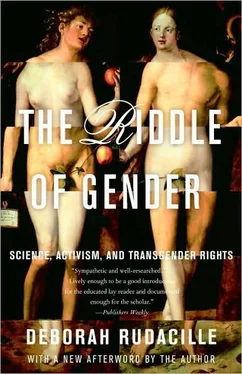Q: Did they think that you were a tomboy?’
I guess so. I remember that I beat up the biggest bully in grade school. Came home with broken glasses from fighting the boys in the street. Got mud all over me and played with trucks. I had a great time. It became a problem only when I got to the age where the boys realized that they shouldn’t be playing with girls. It was at some point in grade school, around nine or so, when it became clear that the boys didn’t want to play with girls anymore. And I’d go over to my friend’s house to play and I remember at one point the parents said, “I don’t think that it’s right for you to play with him anymore,” and I was like “Why not?” I didn’t understand it. I was just having a good time playing. You know, if I had been gay, I think that I might have had a lot of hazing from the other boys, about wanting to play with girls, but…
Q: The gender rules were looser for girls?”
Only up to a certain age, though. At that point it did begin to become quite difficult. I can remember that I wanted to be in the Cub Scouts so bad, and Boy Scouts. Instead I was in the Brownies, and I hated that. We were baking cookies, and I wanted to go camping. I wanted to take shop and auto mechanics. There are a lot of girls who might want to do that stuff, too. I can remember feeling strongly about it and really being distressed, particularly when some of the guys were allowed to take cooking classes. But I’ve always been the kind of person who has had a lot of interests and can keep myself busy, so I just decided to be by myself rather than playing with my sister’s friends or the other girls. I was kind of ostracized growing up. I was never in the “in” group. I was always sort of socially rejected. Because I was different. I really was sort of like that boy in a dress, or something.
I was remembering just the other day something that happened in grade school, or maybe it was in junior high. I remember the Girl Scout leader yelling at me, saying, “Why do you always have to be different, Barbara? Why do you always have to be different?” And she was absolutely at her wits’ end. And I remember being shocked by this because I was always the good kid. You know, I always got good grades and I never got in trouble. I wasn’t trying to cause any trouble. And I remember being shocked because obviously I had, without even trying, really pissed this teacher off. And then I remember, because she shocked me so much, I started thinking about it and kind of said to myself, “You know, I guess I am doing something kind of different than the other girls.” Well, I didn’t want to do what they were doing. That was boring.
So that was what it was like growing up, but then you reach puberty. That got really weird, you know, because then you start to get breasts. I really didn’t want them, and they just seemed like foreign objects. I wore really loose T-shirts just like I’m doing now so that they wouldn’t show. I never did the binding thing, I think because I wasn’t that big-chested, and maybe if I had been I would have. Another thing that I noticed in puberty was my incredible discomfort about wearing dresses. I wanted to wear guys’ clothes. Ever since I could choose my own clothes, I would always wear jeans and shorts.
The only way to explain it is that I felt very uncomfortable and I didn’t understand why. Like when it came time to shave my legs. I didn’t want to do that. I felt like a naked chicken or something. And makeup: there was just no way I was going to put on makeup. And jewelry. I was constantly being given jewelry as gifts and being encouraged to, you know, do my hair, but of course I always had my hair cut short. In puberty, it really started to get very weird. I could never dance because that would mean behaving female, and there was no way that I was going to do that. Dating, wearing dresses—guys never asked me out anyway because I think that I was very masculine in my behavior. But, overall, I guess that I had this feeling of just being wrong in my body. I just started to feel very uncomfortable and in fact became uncomfortable for the rest of my life because you have to wear dresses. If you are a doctor, you have to wear a dress to go to the clinic. You have to wear a dress to funerals and weddings. Having to go to my sister’s wedding and wear this flowery dress. These are amongst the big traumatic experiences of my life!
And that sort of discomfort (because I’ve only changed my sex over the past few years) has characterized most of my life. Just this very, very uncomfortable feeling about being female—every aspect of it. But I didn’t understand it and I was always very confused about it. When I went to college, I was diagnosed with mullerian agenesis.
They realized that I didn’t have a vagina or uterus. I remember the doctors going up and looking for testicles that were undescended, checking my karyotype. They never told me the results of the kary-otype, so I just assumed that it was normal. I remember talking to these doctors and they were saying that they were going to construct an artificial vagina, and I never had any say in the matter. They never asked me if I wanted it. I remember thinking, “God, I’m just an interesting case to them.” They would come in and they would go out, but they would never ask me how I felt. And I had feelings! I felt very confused about the whole thing, like why are they going to do this, and I really don’t feel female, and I didn’t think that I particularly wanted a vagina. But on the other hand, I was a girl and I should have a vagina. It didn’t seem like there was any choice really. And I had a boyfriend at the time—I’m attracted to men, by the way, weakly, not strongly—so I thought if I’m going to have sex with him, I guess that I should have a vagina. But I never really had an interest in vaginal sex. But they did it anyway.
And then I remember when I was in medical school learning about testicular feminization [the discarded name for androgen insensitivity syndrome, a condition in which the lack of cellular receptors for testosterone and dihydrotestosterone creates a female-body morphology even though the person is of XY chromosomal sex], and that seemed to me to be the thing that explained it all when I learned it in class. I still remember that day etched vividly in my mind. It just explained it. I thought, “Okay, I’ve always felt like a guy, and I just have testicular feminization and they just didn’t tell me.” I remember going through the literature when I was in medical school and trying to understand. I assumed that the reason I felt so different about myself was the mullerian agenesis. That’s an aspect that a lot of transsexuals don’t have—they don’t have this physical problem. But for me it was a confounding thing, and a confusing thing. I think it kept me from realizing my transsexuality for a long time. I thought that everything was somehow related to that.
I also knew that my mother had been treated during her pregnancy with an androgen-like drug—not DES, one of the androgenic proges-terones. My sister asked the doctor who treated my mother with this hormone many years ago (he’s long dead now) and she was told that it was definitely not DES, but rather an “androgenic progesterone.” I was never told the exact name. Anyway, I’ve always assumed that my gender variance was due to that drug, and that’s what caused this reproductive defect. But then in fact if you look at the [scientific] literature, there really isn’t a correlation between androgen exposure and mullerian agenesis; there is no evidence that mullerian agenesis is caused by hormonal anomalies. And in addition, women who have mullerian agenesis feel like women. They don’t have this gender disturbance. And again I found that very confusing.
Читать дальше












